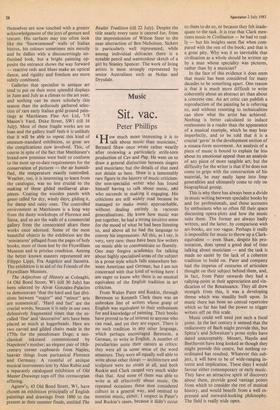Mu s ic
Sit. vac.
Peter Phillips
Iow much more interesting it is to talk about music than musicians,' Bernard Shaw once wrote rather wearily after reviewing a particularly strife-torn production of Cav and Pag. He went on to draw a general distinction between singers and musicians; but the details of that need not detain us here. Shaw is a lamentably rare figure in the history of music criticism: the non-specialist writer who has found himself having to talk about music, acid who succeeds in making it engaging. His criticisms are still widely read because he managed to make music approachable, without dealing entirely in vacuous generalisations. He knew how music was put together, he had a strong intuitive sense for the mood of what he had been listening to, and above all he had the language to convey his impressions. All this, as I say, is very, very rare: there have been few writers on music able to communicate so fluently. One may forgive academics for talking about highly specialised areas of the subject in a prose style which falls somewhere bet- ween American and German, but I am not concerned with that kind of writing here: I am eager to know why there is no musical equivalent of the English tradition in art criticism.
From Walter Pater and Ruskin, through Berenson to Kenneth Clark there was an unbroken line of writers whose grasp of English was equivalent to their enthusiasm for and knowledge of painting. Their books have proved to be of interest to anyone who can read, and yet they are expert. There is no such tradition in any other language, which perhaps encouraged Berenson, a German, to write in English. A number of peculiarities unite their careers as critics: they were all in some sense of the word amateurs. They were all equally well able to write about other things — architecture and sculpture were no strain at all, and both Ruskin and Clark ranged very much wider than that. And none of them was able to write at all effectively about music. On repeated occasions these men considered culture in a general way, and omitted to mention music, either, I suspect in Pater's and Ruskin's cases, because it didn't occur to them to do so, or because they felt inade- quate to the task. It is true that Clark men- tions music in Civilisation — he had to real- ly — but his insights seem flat when com- pared with the rest of the book; and that is a great pity. Why was it so inevitable that civilisation as a whole should be written up by a man whose speciality was pictures, rather than by a musician?
In the face of this evidence it does seem that music has been considered for many decades to be something apart. One reason is that it is much more difficult to write coherently about an abstract art than about a concrete one. An art critic can publish a reproduction of the painting he is referring to, and without resorting to technicalities can show what the artist has achieved. Nothing is better calculated to induce restlessness in a reader than the appearance of a musical example, which he may hear imperfectly, and to be told that it is a crucial 'germ' in the development section of a sonata-form movement. An analysis of a piece of music is bound to explain far less about its emotional appeal than an analysis of any piece of more tangible art; but the difficulty for the writer is that if he does not come to grips with the construction of his material, he may easily lapse into limp generalities and ultimately come to rely on biographical gossip.
This is why there has always been a divide in music writing between specialist books by and for professionals, and those accounts by enthusiasts who so often fill their space discussing opera-plots and how the music suits them. The former are always badly written, and the latter, by comparison with art-books, are too vague. Perhaps it really is impossible for music to throw up a Clark- equivalent — even Shaw, despite his pro- testation, does spend a good deal of time talking about musicians — and the task is made no easier by the tack of a coherent tradition to build on. Pater and company had the impetus of centuries of articulate thought on their subject behind them, and, in fact, from Pater onwards they had a rallying-point in their appreciation and vin- dication of the Renaissance. They all drew strength from this, it was a developing theme which was steadily built upon. In music there has been no central repertoire which so far has had the power to trigger writers off on this scale.
Music could well need just such a focal point. In the last century it seemed that the rediscovery of Bach might provide this, but Spitta's and Schweitzer's prose styles have dated unacceptably. Mozart, Haydn and Beethoven have long looked as though they might provide this centre, but nothing co- ordinated has resulted. Whatever this sub- ject, it will have to be of wide-ranging in- terest and implication. These days I would favour either contemporary or early music. They have an attractive spirit of discovery about them, provide good vantage points from which to consider the rest of musical history, and would benefit from a well ex- pressed and outward-looking philosophy. The field is really wide open.






































 Previous page
Previous page